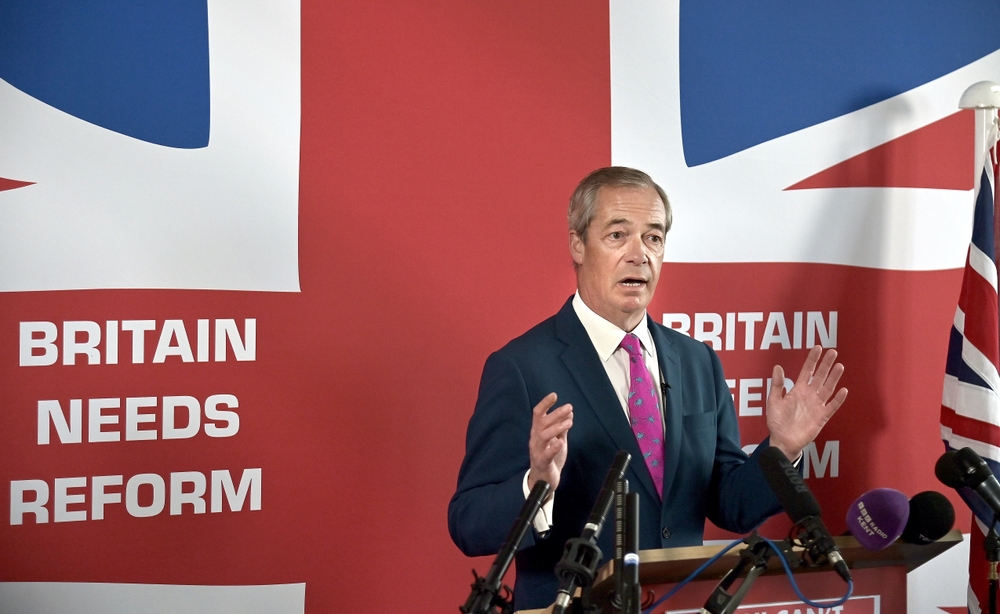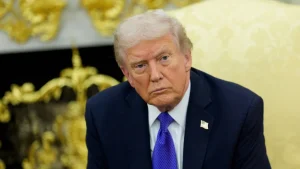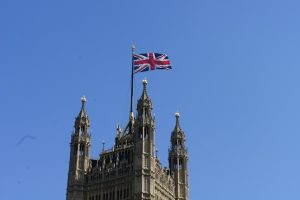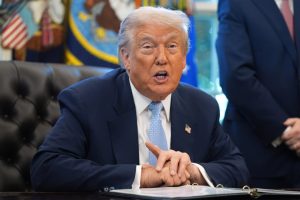Why Nigel Farage Deserves to Be the Next Prime Minister of the UK.
Nigel Farage delivered a surprising political forecast on Friday 17 January, asserting that he will ascend to the position of Prime Minister of Britain before the year 2030.
During a well-attended event in Washington DC organized in his honor, the Reform Leader was celebrated by Republican attendees as a prospective Prime Minister. He addressed the audience with a view of the White House, stating that Donald Trump's triumph represents not only a success for America but also for the free world at large. Mr. Farage emphasized that comparable movements are currently emerging across Europe, including in the United Kingdom.
Nigel Farage is a name that divides opinion in British politics. To some, he is a visionary who spearheaded the campaign for Brexit and fundamentally reshaped the UK’s political landscape. To others, he is a divisive figure, known for his blunt rhetoric and controversial views. However, despite the polarisation surrounding him, there is a compelling argument to be made for why Nigel Farage should be the next Prime Minister of the United Kingdom. His experience, populist appeal, and unwavering commitment to national sovereignty, alongside the growing dissatisfaction with the current political system, make him a candidate worth considering.
A Political Career Built on Change
Farage’s political journey has been one of persistence and gradual influence. He first entered the political sphere with the UK Independence Party (UKIP), which was, at the time, a fringe party. UKIP’s primary focus was to advocate for the UK’s withdrawal from the European Union, a cause that Farage believed was essential for the future of the nation. Under his leadership, UKIP grew from a small group of disillusioned voters to a significant political force.
Farage’s ability to lead UKIP through difficult times and to maintain his position as the figurehead of the party demonstrated his political acumen. His understanding of the electorate, his ability to communicate directly with the public, and his tenacity in the face of adversity were qualities that would later serve him well in the battle for Brexit.
Farage’s leadership of UKIP culminated in the 2014 European Parliament elections, where the party achieved a historic victory. UKIP topped the polls in the UK, and Farage was lauded for his ability to galvanise voters and draw attention to the issue of the UK’s membership in the European Union. The results were a clear sign that there was a large section of the British public that was dissatisfied with the status quo and yearned for a leader who would take action on their concerns.
The Brexit Movement: Farage’s Defining Legacy
If there is one issue that has defined Nigel Farage’s political career, it is Brexit. Farage was not only a staunch advocate for leaving the European Union, but he was also one of the most prominent voices in the successful campaign to leave. The 2016 referendum on EU membership marked a pivotal moment in British politics, and Farage played a crucial role in shaping the debate.
The Brexit campaign, led by Farage and his allies, argued that the UK’s membership in the European Union undermined the nation’s sovereignty, control over its borders, and ability to make independent decisions. The "Leave" campaign resonated with millions of voters who felt that their voices had been ignored by the political establishment. Farage was able to tap into this frustration and communicate it to the wider public, presenting himself as a champion of the people against the elite.
The victory of the "Leave" campaign was, in large part, due to Farage’s leadership and his ability to rally voters who were sceptical of the EU. The result of the referendum—52% of voters chose to leave the EU—shocked the political establishment, but Farage remained steadfast in his belief that the UK was better off outside the European Union.
While the Brexit process has been fraught with challenges and disagreements, Farage’s influence on the outcome cannot be overstated. He was instrumental in shaping the national conversation around Europe, and his dogged determination in the face of opposition helped push the issue to the forefront of British politics.
A Champion of the People
One of the reasons that Farage has gained such a devoted following is his ability to connect with ordinary people. Unlike many of his political peers, who are seen as part of the establishment, Farage has cultivated an image of being an outsider—a man of the people. He speaks directly to his audience, often using blunt language and adopting a no-nonsense approach that appeals to voters who feel that their concerns are ignored by the political elite.
Farage’s populist appeal has been a central feature of his political career. He has consistently positioned himself as a champion of the working class, focusing on issues such as immigration, national sovereignty, and the erosion of British culture and identity. In an era of growing disenchantment with traditional politics, Farage’s rhetoric has struck a chord with many voters who feel disconnected from the political class.
His ability to speak to the concerns of ordinary people is perhaps best exemplified by his comments during the Brexit campaign, where he highlighted the impact of immigration on local communities and the need for the UK to take control of its borders. Farage’s willingness to discuss sensitive issues that many politicians avoid has earned him both admiration and criticism, but it has undeniably solidified his place as a leader of the populist movement in the UK.
Farage’s Vision for the Future
If Farage were to become Prime Minister, his vision for the future of the UK would undoubtedly be shaped by his long-standing beliefs in national sovereignty, free markets, and the importance of individual freedom. His advocacy for a smaller government, lower taxes, and a free-market economy is in line with traditional conservative principles. Farage has consistently argued that the UK should focus on its own interests rather than being beholden to international agreements or bureaucracies, such as the European Union.
At the heart of Farage’s political ideology is a belief in the importance of national sovereignty. His argument for Brexit was based on the idea that the UK should be free to make its own laws, control its own borders, and pursue policies that are in the best interest of the British people. As Prime Minister, Farage would likely prioritise policies that restore the UK’s independence from international organisations and focus on promoting national interests.
Additionally, Farage has long championed the idea of a “Global Britain” post-Brexit. He envisions a UK that is free to forge its own trade deals with countries around the world, independent of EU restrictions. Under his leadership, the UK would likely focus on building strong trade relationships with emerging markets, while also strengthening ties with traditional allies such as the United States and Commonwealth nations. Farage’s vision of a post-Brexit Britain is one where the country is economically competitive, globally connected, and politically sovereign.
A Voice for the Disillusioned
One of the most compelling reasons to consider Farage for Prime Minister is his ability to represent the growing number of people who feel disenfranchised by the current political system. The UK’s political establishment has been under increasing scrutiny in recent years, with many voters expressing frustration at the failure of mainstream parties to address their concerns.
Farage has consistently positioned himself as a voice for the voiceless, speaking for those who feel that their concerns have been ignored by the political elite. His populist rhetoric, which emphasises the importance of listening to the people and challenging the establishment, resonates with voters who are tired of the status quo. Farage’s ability to tap into this disillusionment has made him a powerful force in British politics, and his influence is only likely to grow as more people seek an alternative to the traditional parties.
Farage has also been vocal in his criticisms of the media, which he believes plays a significant role in shaping public opinion and perpetuating the political establishment’s narrative. He has often accused the media of bias and of failing to represent the views of ordinary people. This anti-establishment stance, combined with his willingness to speak his mind, has endeared him to many voters who feel that the mainstream media is out of touch with their concerns.
The Challenges Ahead
While there are many reasons why Nigel Farage could make an effective Prime Minister, there are also significant challenges that he would need to overcome. One of the biggest hurdles is the need to unite a fractured political landscape. The UK’s political parties are deeply divided, and Farage would need to find a way to bridge these divisions and create a government that is capable of governing effectively.
Farage’s history of leading smaller parties, such as UKIP and the Brexit Party, could be seen as both an asset and a liability. While his leadership of these parties has demonstrated his ability to build and lead political movements, it also highlights the challenges he faces in gaining the support of a wider electorate. For Farage to become Prime Minister, he would need to attract support from not only the populist right but also more centrist voters who may be sceptical of his approach.
Another challenge for Farage is his controversial reputation. His outspoken views on issues such as immigration, the European Union, and political correctness have earned him a great deal of criticism. For some, his rhetoric is seen as divisive, and his style of politics is viewed as inflammatory. Farage would need to address these concerns and present himself as a leader who can unite the country, rather than deepen divisions.
Nigel Farage and Elon Musk
After an earlier fall out this month, Nigel Farage has said he wants to "mend fences" with Elon Musk, after the billionaire Trump adviser called for him to be replaced as leader of Reform UK. Just before Christmas, Farage told journalists that his party was in "negotiations" with Mr Musk, the world's richest man, about a potential donation.
However, by the new year, the relationship had soured, with Tesla boss Mr Musk stating that Farage "did not have what it takes" to lead the party.
Farage suggested that the rift was due to a disagreement over Mr Musk’s support for the jailed far-right activist Tommy Robinson. Speaking on LBC, Farage explained that he planned to repair his relationship with Mr Musk during a forthcoming "four or five" day trip to the US for Donald Trump's inauguration as president on 20 January.
"Of course I want his support, of course I will talk to him in America in a few days' time, of course I want to mend any broken fences that might exist," he said.
"I have no desire to go to war with Elon Musk and I'm not going to, and I haven't done," he added. "I'm a huge admirer of him - I think he's an heroic figure."
He reiterated his belief that losing Mr Musk's support would damage the party’s chances with younger voters, as the tech entrepreneur was "a cult hero figure" and "he kind of makes us look cool."
However, Farage made it clear he "would not be moved" over Mr Musk’s call to free Tommy Robinson, whose real name is Stephen Yaxley-Lennon. Robinson was jailed in October last year for repeating false claims against a Syrian refugee.
The Reform UK leader said many of his "American friends" had only "seen one side of the Robinson story" and were unaware of Robinson’s criminal record.
"He has been in prison many times over the years... Once he almost brought down a trial at which gang rapists were ultimately convicted," Farage said.
He added that embracing Robinson would do Reform UK "immense harm, and probably rightly so."
However, Farage insisted that Mr Musk’s backing was "not crucial" and suggested the falling out with the billionaire could ultimately benefit Reform UK in the future.
He added: "The fact that I've stood up on a point of principle - even if in the short term it's to my detriment - in the long run may even work in our favour."
The Way Forward
For Nigel Farage to become the next Prime Minister of the UK, he must navigate several significant challenges. First and foremost, he needs to unite the fragmented right-wing of British politics. While Farage has a loyal following among populist voters, particularly those who supported Brexit, he must consolidate support from other factions on the right. This includes gaining the backing of groups such as his own Reform UK, UKIP, and potentially appealing to dissatisfied Conservative Party voters. To do so, Farage would need to forge strategic alliances and present a clear alternative to the more centrist leadership currently in place.
Expanding his appeal beyond his traditional populist base is another crucial step. Farage has a strong following among those who feel disillusioned with the establishment, but for him to secure the role of Prime Minister, he must broaden his support. This means attracting centrist and moderate left-leaning voters who may not be swayed by his strong stances on issues like immigration or political correctness. To do so, Farage would need to adjust his rhetoric, toning down some of his more divisive views and positioning himself as a leader who can represent all sections of British society.
Building a strong and influential political party is essential for Farage’s chances of becoming Prime Minister. Reform UK, or any political vehicle he uses, must gain substantial representation in Parliament. This means securing more Members of Parliament and forming a credible opposition to the Labour and Conservative parties. Farage must continue to strengthen Reform UK and develop a comprehensive policy platform that addresses the key concerns of the electorate, such as healthcare, education, and the economy. Without a solid political foundation, Farage’s path to Downing Street would be tenuous at best.
Farage must also present clear, pragmatic policies on the pressing national issues that will resonate with voters. His leadership in the Brexit campaign has defined his political career, but now he needs to show that he can govern on a range of other topics. For many voters, issues such as the post-Brexit economy, healthcare, and national security are paramount. Farage needs to develop well-thought-out policies on these matters that can convince the public that he is the right person to lead the country beyond Brexit.
Managing his public image will be critical for Farage, especially given the criticism he has faced for his divisive rhetoric. His blunt, combative style has alienated some potential supporters who see him as too extreme. If Farage is to broaden his appeal, he must tone down his more controversial statements while still maintaining his strong stance on issues like national sovereignty and immigration. Balancing his populist appeal with a more moderate image will be a delicate task but is necessary if he hopes to attract undecided voters and those wary of his extreme views.
One of Farage’s key advantages is the growing disillusionment with the political establishment. Many voters feel that traditional political parties, including Labour and the Conservatives, no longer represent their interests. Farage can tap into this anti-establishment sentiment by positioning himself as an outsider who understands the frustrations of ordinary people. By continuing to challenge the political elite and advocating for the concerns of the public, Farage could further galvanise support and create a sense of momentum for his leadership bid.
Finally, Farage would need to run a highly effective election campaign. His ability to galvanise support in the lead-up to Brexit demonstrated his political acumen. Farage must replicate this success by targeting key constituencies, crafting a compelling and unified message, and engaging in grassroots mobilisation. Raising funds, gaining media coverage, and building a broad coalition of voters will all play a critical role in securing a path to the Prime Minister’s office.
To become Prime Minister, Farage must overcome several hurdles, including uniting right-wing factions, broadening his appeal, and presenting a practical, unifying vision for the UK’s future. While these challenges are considerable, with the right strategy, policy platform, and public image, Farage could rise to lead the country. However, whether he can navigate these obstacles remains to be seen.





















